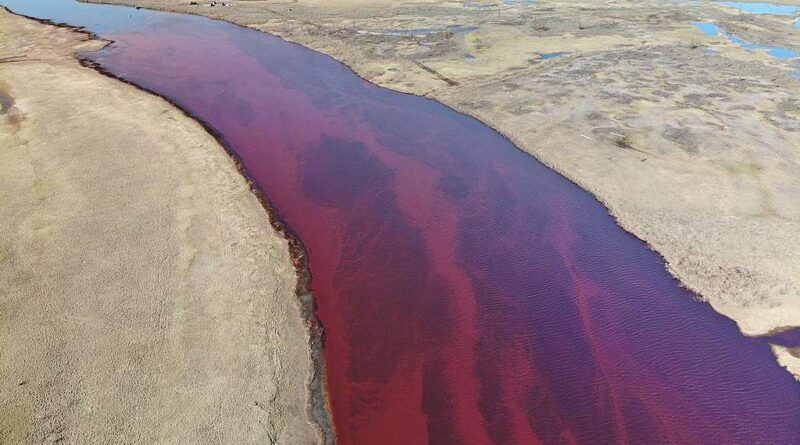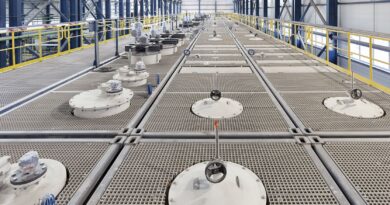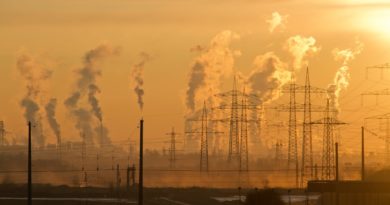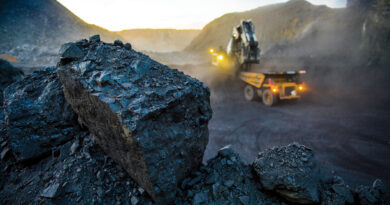ENVIRO-DISASTER: Nornickel oil-spill paints river red
Last month, Russia suffered one of the worst environmental disasters in its history as 21,000 tonnes of diesel oil flooded into the Arctic Circle after a diesel tank at Russian nickel and palladium giant Norilsk Nickel’s powerplant burst.
On the 29th of May, a tank containing diesel oil at the Nadezhda plant on the Taymyr peninsula in the Russian Arctic burst, spilling in excess of 20 thousand tonnes of oil products into the local environment, contaminating more than 20km of local water courses and turning the Ambarnaya River red as it carries the petrochemical plume – up to 20cm thick – slowly towards the sea.
This is one of the biggest oil product accidents ever to have occurred in the Russian Arctic, and proves what everyone knew all along – that there is no guaranteed safe way to extract or store fossil fuel products, especially in this remote and inhospitable Arctic region.
The plant is operated by a division of Nornickel, whose factories in the area have made the city of Norilsk one of the most heavily polluted places on Earth.
After the spill, reports emerged that local officials had only discovered that the catastrophe had occurred two days later, via media reports. President Vladimir Putin himself was furious, asking the head of Nornickel ‘Are we going to learn about emergency situations from social media?’ in a televised conference call. A state of emergency immediately was declared in Norilsk and the Taymyr peninsula.
It is possibly second in scale only to the 1994 Komi pipeline spill, which was, by some estimates, over eight times larger in volume than the Exxon Valdez in Alaska in 1989.
Nornickel firm blamed thawing permafrost for the disaster – but observers including Greenpeace suspect the ageing Soviet-era infrastructure was years beyond its safe use and they knew about the thawing ice.
Oil spill at the Nornickel plant spewed thousands of tonnes of oil into land and water in Taimyr, Siberia, turning the Ambarnaya River red
As Vladimir Putin declared a state of emergency, a flurry of ecologists, journalists, and officials scrambled to the area. But the public interest is always brief.
The Komi Republic in northwest Russia suffers almost constant, smaller-scale oil spills, across the country every year. The people both of Komi and of the Siberian Taimyr region share a particular misfortune of being remote enough that the disasters taking place in their homelands escape attention.
A local fisherman said: “Apparently, the government is making a serious effort to eliminate the consequences. But the problem is that not all diesel can be removed, so water resources will be catastrophically affected.
This accident is devastating to our economy. The river is spawning, and our people go fishing there. In general, the river feeds us. It is… like a supermarket for you. In the city you can go to the store, but we live in a tundra. And if the river is polluted, there will be no more fish for us.
But we will lose not only fish. A wild deer is likely to change migration routes, so we will have to travel hundreds of kilometers for hunting.
Norilsk Nickel got off easily. They only lose money; we lose water, land, wildlife, fish resources, and the ability to provide our families with minimum income. ”
According to Vladimir Chuprov, the Project Director at Greenpeace Russia, Nornickel is claiming to have cleaned up 90% of the spill but at the same time getting in the way of allowing the water to be independently tested.
“In our experience, only up to 10% of the leaked oil products in a spill of such scale can be cleaned up. Independent data can help to cope with the consequences of the catastrophe, but hiding information only leads to total mistrust of the official information,” said Chouprov.
Nornickel is a Russian nickel and palladium mining and smelting company. Its largest operations are located in the Norilsk–Talnakh area near the Yenisei River, in northern Russia.




